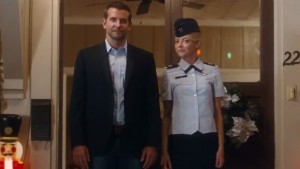 In Cameron Crowe’s 1989 debut feature film, Say Anything…, John Cusack’s underachieving, kick-boxing oddball, Lloyd Dobbler, convinces his love interest, Diane Court (Ione Skye), into dating him and staying with him because he is a good guy who does the right thing. He might be quirky and peculiar but he care for his sister, his friends, and stands up for what is right. Ultimately, the final third of the movie is Lloyd’s character triumphing over his reputation for being a slacker and not having a plan for his life to protect and love the young woman he loves.
In Cameron Crowe’s 1989 debut feature film, Say Anything…, John Cusack’s underachieving, kick-boxing oddball, Lloyd Dobbler, convinces his love interest, Diane Court (Ione Skye), into dating him and staying with him because he is a good guy who does the right thing. He might be quirky and peculiar but he care for his sister, his friends, and stands up for what is right. Ultimately, the final third of the movie is Lloyd’s character triumphing over his reputation for being a slacker and not having a plan for his life to protect and love the young woman he loves.
In Cameron Crowe’s latest film, Aloha, his main character, once-famed military contractor Brian Gilchrist played by Bradley Cooper, is the polar opposite of Lloyd Dobbler. Gilchrist is a broken man, carrying the weak leg and broken relationships of his previous bad decisions. Right away, over the opening music, Gilchrist explains his rough past and the one last chance he is getting as he flies to the place of his greatest triumphs, Hawaii, for a “gate blessing” (a traditional Hawaiian sendoff) and a chance to lead a ground-breaking satellite launch by his private aerospace employer Carson Welch (Bill Murray). After arriving and meeting old friends, an old flame (Rachel McAdams) and her husband (John Krasinski), and a frenetic and slightly shrill Air Force captain (Emma Stone), Gilchrist’s return is a chance to make right the many things he has done wrong. Hawaii is symbolic of the one portion of his life that went right, his relationship with Tracy (McAdams) and his friendships with military personnel and locals.
Previous bad decisions and the past loom large for many characters in Aloha. Their moral and relational failures have caused alienation and fear of loving relationship. Stone’s Allison is such a career-driven odd-duck that it has left her with a successful service record and commendations but with no friends. Tracy and her husband Woody (Krasinski) are alienated from each other by both past decisions as well as a failure to communicate. Gilchrist tops them all, having pushed away the one love of his life, Tracy, because of his work, and who he is rears its potential to pull the same thing, again. What Gilchrist and others must decide is to give grace and allow loving community to triumph over alienation and fear. 
The simple message of second chances, love, and overcoming isolation are unfortunately lost in the murky waters of Crowe’s direction and editing. While the movie has some genuine heart; McAdams does a decent job and Krasinski delivers with his limited scenes, the overall narrative is hard to piece together on viewing and is a cobbled together mess. There are three specific instances where it is easy to tell that two takes were spliced together rather haphazardly (which is odd considering the budget and big names attached to the movie) and bizarre choices are made with the camera work and are quite distracting and disorienting. It hurts to say that about the man who made Say Anything…, Jerry Maguire, and Almost Famous.
This movie, overall, had some positive story elements that could have landed so much better had the time been taken to blend a cinematically and narratively cohesive story. Unfortunately, it does none of those things and it is best to stop writing before it gets ugly.

